 Petzlover
Petzlover Harrier is originated from United Kingdom but Kangal Dog is originated from Turkey. Harrier may grow 35 cm / 13 inches shorter than Kangal Dog. Harrier may weigh 36 kg / 79 pounds lesser than Kangal Dog. Both Harrier and Kangal Dog has almost same life span. Harrier may have less litter size than Kangal Dog. Both Harrier and Kangal Dog requires Moderate Maintenance.
Harrier is originated from United Kingdom but Kangal Dog is originated from Turkey. Harrier may grow 35 cm / 13 inches shorter than Kangal Dog. Harrier may weigh 36 kg / 79 pounds lesser than Kangal Dog. Both Harrier and Kangal Dog has almost same life span. Harrier may have less litter size than Kangal Dog. Both Harrier and Kangal Dog requires Moderate Maintenance.
 Developed in Great Britain, the Harrier is another hunting dog – a hound that primarily hunts hares and small prey. The breed itself is medium sized - smaller than an English Foxhound and larger than a Beagle. Although the definitive origins of the Harrier are not set, it is believed that he is a cross of the Basset Hound, Talbot Hound and Bloodhound. Others believe the breed is a cross of the Greyhound and the English Foxhound. The Harrier looks like a smaller version of the English Foxhound.
Developed in Great Britain, the Harrier is another hunting dog – a hound that primarily hunts hares and small prey. The breed itself is medium sized - smaller than an English Foxhound and larger than a Beagle. Although the definitive origins of the Harrier are not set, it is believed that he is a cross of the Basset Hound, Talbot Hound and Bloodhound. Others believe the breed is a cross of the Greyhound and the English Foxhound. The Harrier looks like a smaller version of the English Foxhound.
The Harrier is a pack dog and in 1260, Sir Elias de Midhope established the first pack in England. From there the breed spread to Wales and Western England, most used in Ireland where they hunt fox as well as hares. However, hunting hares is the specialty of the breed and even gave the breed its name. In 1885 they were recognized by the American Kennel Club in the Hound Group. Yet despite this and despite the number of Harriers working in England, they are not recognized by the UKC.
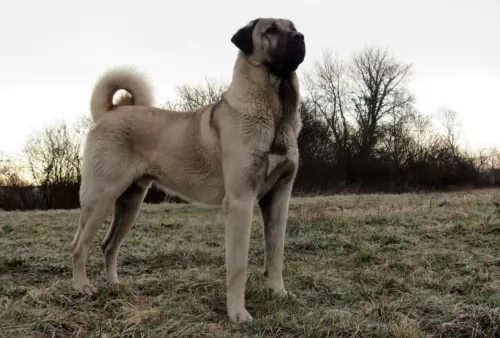 The magnificent looking Kangal Shepherd Dog, a purebred Mastiff type dog, is often referred to as a sheep dog and hails from the Sivas province of Turkey.
The magnificent looking Kangal Shepherd Dog, a purebred Mastiff type dog, is often referred to as a sheep dog and hails from the Sivas province of Turkey.
The Kangal Dog is a distinct breed and the National Dog of Turkey. These are working dogs who made their appearance in the UK in 1965.
It is interesting to note that in June 2018 the Turkish Kennel Club, Köpek Irklari ve Kinoloji Federasyonu, classifies Kangal Shepherd Dogs to be the same population as the Anatolian Shepherd dog.
 The Harrier is a typical hound dog much like the English Foxhound. The breed is a little smaller than the Foxhound but is muscular and large boned like his cousin. They have short hard hair that sheds and ears that hang. The Harrier is a large boned breed built for strength and stamina in the race with hares. They have broad skulls, strong muzzles, with hazel or brown eyes. They also have a black, wide nose and a high, medium length tail.
The Harrier is a typical hound dog much like the English Foxhound. The breed is a little smaller than the Foxhound but is muscular and large boned like his cousin. They have short hard hair that sheds and ears that hang. The Harrier is a large boned breed built for strength and stamina in the race with hares. They have broad skulls, strong muzzles, with hazel or brown eyes. They also have a black, wide nose and a high, medium length tail.
They say he has a ‘courtly grin’ on an expressive face. Being pack dogs, they must be sturdy, able to cover any type of terrain, for as long as the hare runs. It is critical that their scenting and running tools are exceptional. He is blue or yellow-pied. His feet are cat like and the chest is dropped low. He is an extremely well-proportioned dog
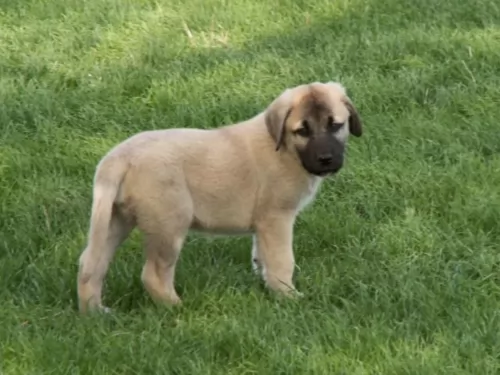 This is a large, heavily boned dog with a big head with a black mask and medium sized floppy ears. Looking at him, he has a Mastiff-like appearance but isn't as heavy as some Mastiff breeds, allowing it more speed and agility.
This is a large, heavily boned dog with a big head with a black mask and medium sized floppy ears. Looking at him, he has a Mastiff-like appearance but isn't as heavy as some Mastiff breeds, allowing it more speed and agility.
He stands at roughly 72cm to 85cm male and female, and weighs about 50 to 63kg. He has a solid double coat of dense hair which is a pale tan color.The coat is short and dense. The Kangal Dog is powerful and when he is alert, the long tail is held over the back, otherwise he holds it down with a slight curl.
The Kangal is known for his good looks, but he is also alert, sharp, territorial and confident, while also being calm. These dogs have an instinctive wariness of strange dogs and they are also reserved with strangers but are loving, loyal and protective with their human family.
In fact, the Kangal Shepherd Dog is protective while being gentle with small children and animals. He is an intelligent breed too, and having him trained and socialized won’t be a problem.
It is always a wise move to have a big dog like this trained and socialized, making him obedient and even more amicable than he already is.
 Yes, they are good with children but are very rambunctious and should be supervised with young children.
Yes, they are good with children but are very rambunctious and should be supervised with young children.
Scenting ability and wonderful personality
This breed is very adaptable as long as it gets enough exercise. He can live in the country or she can live in the city with an outlet for exercise.
Smart but stubborn at times. Therefore, his learning ability is moderate.
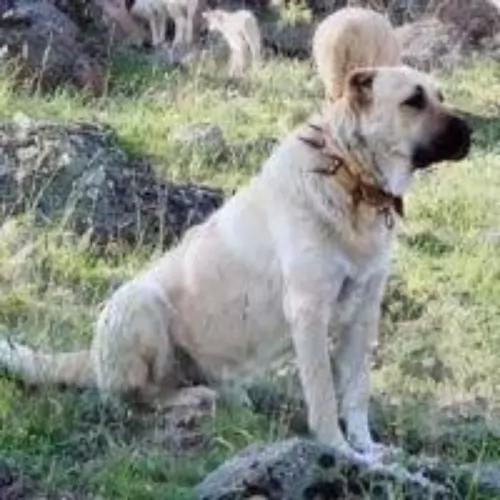 Your Kangal Dog is a big, powerful dog. His very size size won't suit him living in the city in small spaces and tiny gardens. He is far better suited to life in the suburbs or to country life where he can move around easily.
Your Kangal Dog is a big, powerful dog. His very size size won't suit him living in the city in small spaces and tiny gardens. He is far better suited to life in the suburbs or to country life where he can move around easily.
In spite of his size, he is a calm, balanced, independent, protective dog. He may well be aloof towards strangers, but a trained and well-socialized Kangal Dog is friendly, loving and loyal pet with his human family and with visitors to the house.
This is a beautiful dog and it will be an honor to have such a wonderful pet in your home. Treat him well and you're bound to have the most fantastic protector, guardian and friend.
 It seems the only real health issue other than hunting accidents or foot and toe incidents due to hunting.is:
It seems the only real health issue other than hunting accidents or foot and toe incidents due to hunting.is:
This abnormality in the hip socket can cause arthritis and lameness that is very painful. This is the most severe form. The Harrier can have a milder form that does not progress to this level. Hip dysplasia has a genetic component, but the environment plays a role as well and active hunting dogs are especially prone to this.
Floppy ears that hang down are always susceptible to ear infections. Check them often and clean them at least weekly.
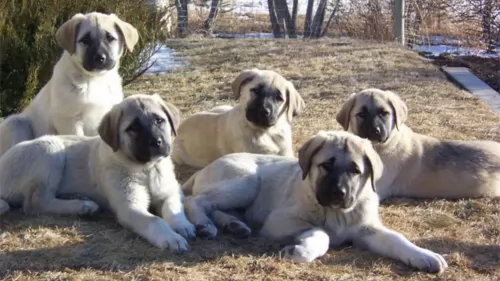 This is most important if you don't intend your Kangal Dog becoming a parent, and is good for the health of your dog.
This is most important if you don't intend your Kangal Dog becoming a parent, and is good for the health of your dog.
Your Kangal Dog puppy needs certain vaccinations at certain stages of his life to prevent him from getting some life threatening dog diseases. Keep a check on your dog's health and realize, that although the Kangal Dog is a healthy dog breed, he can develop canine illnesses such as eye diseases, ear infections, bloat, skin allergies and hip dysplasia among others.
Your dog may then require veterinary intervention to heal him of any of these.
To keep your pet happy and healthy, make sure to pick up your dog's faeces every day. This is for your own health's sake too.
 Feed a high nutrition puppy food dry food made for an energetic breed. Feed 3 times a day ½-3/4 cup each time.
Feed a high nutrition puppy food dry food made for an energetic breed. Feed 3 times a day ½-3/4 cup each time.
Again feed a high nutrition adult food for an active breed. Feed twice a day 1-11/2 cups each time.
Outstanding health unless in a hunting accident.
The Harrier is an energetic, hunting breed that needs a lot of exercise on a daily basis. Long walks and jogging or running is good for the Harrier. If they are not working, hunting dogs they need more exercise. A fenced yard for playing is good. If this intense breed does not get enough exercise and mental stimulation, he needs there could be issues with destructive behavior and obesity. Flyball, tracking, agility, coursing, rally and hunting are great activities for this breed of dog. In addition, they are pack animals and do better in a family that has more than one dog.
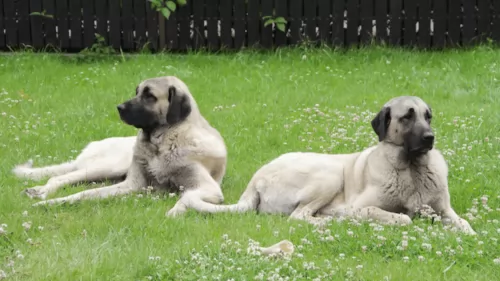 The Kangal Dog can be a wonderful pet in your home, but because you’ve made the decision to bring him into your home, it becomes your responsibility to ensure his happiness and wellbeing.
The Kangal Dog can be a wonderful pet in your home, but because you’ve made the decision to bring him into your home, it becomes your responsibility to ensure his happiness and wellbeing.
These ‘care’ tips can help you, particularly if you’re a first time dog owner -
Remember that a puppy will need 4 meals a day of soft, recommended puppy food. By the time your dog reaches his first birthday, one or two meals a day will be good.
There are some top quality commercial manufactured foods to choose from, and the packaging labeling will guide you to which one.
Adding in some home-made food such as nutritious cooked chicken, rice and vegetables will be a treat for your pet and don’t forget some raw meat occasionally too.
Fresh, cool water should be within reach of your pet around the clock.
Dogs need exercise to maintain their lean bodies but it will also stimulate their minds and keep them healthy. The exercise needs of your dog will depend on his size, age, health and breed type. Fun and games as well as daily walks will satisfy your Kangal Dog and keep him content.
Help keep your Kangal Dog looking groomed and cared for. He is a fairly heavy, seasonal shedder. Remove loose hairs with brushing the coat twice a week. Check for fleas and ticks at the same time and for any unusual lumps.
Every dog needs a warm, dry, quiet place to rest and sleep, inside and outside. Make sure that when your dog is outside that he has a place to rest in the shade and sun, as he chooses.